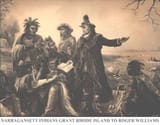Search Results
7/12/2025, 2:32:05 AM
>>17832239
>How can you study history thoroughly and remain a committed Christian?
Narrow it down to only those who correctly practiced believer's baptism and believed in religious freedom.
In 1663, the colony of Rhode Island and Providence plantations was given express permission to practice religious (and ideological) freedom, becoming the first territory in modern history to have such freedom. In the early years of the American colonies, those who were persecuted by the puritans and forced to pay church taxes in places like Plymouth could find a home in Rhode Island. Later, the principle of religious freedom was enshrined in the United States Constitution. Since then, we have seen the potential unlocked by allowing freedom, and it all started with some Christians allowed to exercise their faith freely without compulsion.
John Clarke worded his appeal to Charles II for religious liberty for the colony in the following way:
"That they might be permitted to hold forth a lively experiment that a most flourishing civil state may stand, and best be maintained, with a full liberty in religious concernments; and that true piety, rightly grounded upon gospel principles, will give the best and greatest security to sovereignty, and will lay in the hearts of men the strongest obligation to true loyalty."
Also, if you survey the scope of history prior to this, you will find that there were always churches in various parts of Europe which tenaciously exercised these same biblical principles. Both the protestants and the catholics opposed them during the Reformation era. The famed reformer Heinrich Bullinger compared the credobaptists of his day to the ancient Donatists. The Donatists represented a faction of 4th century Christians who had refused to join up with Constantine's state church, resulting in them being demonized and even persecuted to some extent for it. They had always refused to coerce anyone to convert, unlike Catholicism under Augustine's "just war" theory.
>How can you study history thoroughly and remain a committed Christian?
Narrow it down to only those who correctly practiced believer's baptism and believed in religious freedom.
In 1663, the colony of Rhode Island and Providence plantations was given express permission to practice religious (and ideological) freedom, becoming the first territory in modern history to have such freedom. In the early years of the American colonies, those who were persecuted by the puritans and forced to pay church taxes in places like Plymouth could find a home in Rhode Island. Later, the principle of religious freedom was enshrined in the United States Constitution. Since then, we have seen the potential unlocked by allowing freedom, and it all started with some Christians allowed to exercise their faith freely without compulsion.
John Clarke worded his appeal to Charles II for religious liberty for the colony in the following way:
"That they might be permitted to hold forth a lively experiment that a most flourishing civil state may stand, and best be maintained, with a full liberty in religious concernments; and that true piety, rightly grounded upon gospel principles, will give the best and greatest security to sovereignty, and will lay in the hearts of men the strongest obligation to true loyalty."
Also, if you survey the scope of history prior to this, you will find that there were always churches in various parts of Europe which tenaciously exercised these same biblical principles. Both the protestants and the catholics opposed them during the Reformation era. The famed reformer Heinrich Bullinger compared the credobaptists of his day to the ancient Donatists. The Donatists represented a faction of 4th century Christians who had refused to join up with Constantine's state church, resulting in them being demonized and even persecuted to some extent for it. They had always refused to coerce anyone to convert, unlike Catholicism under Augustine's "just war" theory.
Page 1
